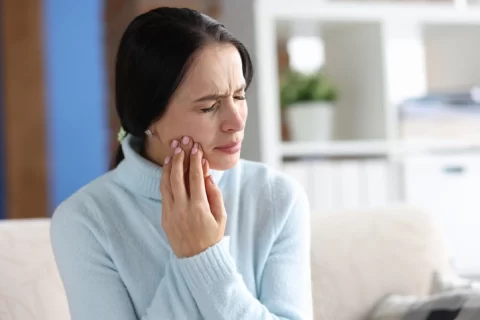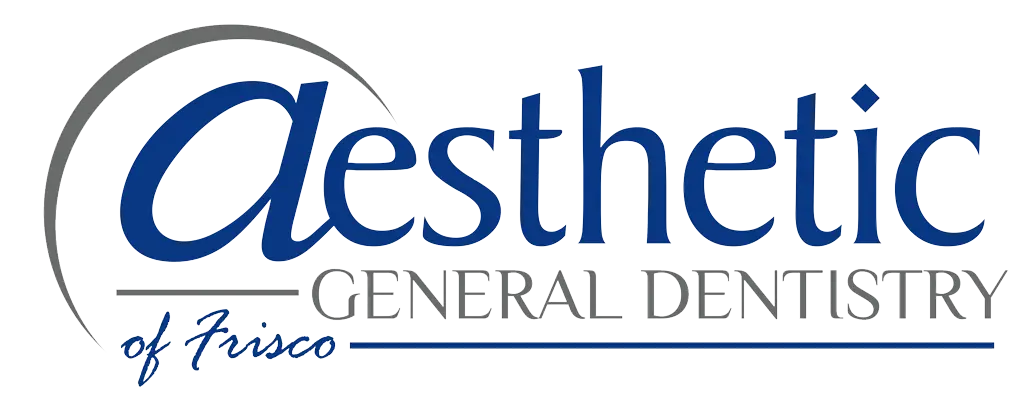Dental Injury
Frisco TX
It is possible for anybody, at any moment, to sustain a dental injury. Whether it’s a sports-related accident, a fall, or any unexpected trauma, understanding the causes, types, and prevention strategies for dental injuries is crucial for protecting your smile.
At Aesthetic General Dentistry of Frisco, we are dedicated to helping you safeguard your oral health.

Causes of Dental Injuries
Dental injuries can occur due to various causes, including:
- Sports and Recreational Activities: Contact sports like football, soccer, and basketball pose a significant risk of dental injuries. However, injuries can also happen during non-contact activities such as cycling or skateboarding.
- Accidents and Falls: Trips, falls, and accidents, whether at home, work, or public places, can result in dental injuries. Falling face-first onto a hard surface can cause significant trauma to the teeth and mouth.
- Biting Down on Hard Objects: Sometimes, biting down on hard objects like ice, pens, or unpopped popcorn kernels can lead to tooth fractures or chipping.
- Vehicle Accidents: Car accidents can cause dental injuries, especially when the face comes into contact with the steering wheel, dashboard, or airbags.
Types of Dental Injuries
Dental injuries can vary in severity, from minor chips and cracks to more serious problems. Common types of dental injuries include:
- Tooth Fractures: Teeth can fracture in various ways, such as chipping, cracking, or breaking into pieces.
- Tooth Dislocation: The tooth may become partially or severe trauma has caused it to be totally dislocated from its socket.
- Tooth Avulsion: Complete dislodgement of a tooth from its socket is known as tooth avulsion. Immediate action is crucial to attempt to save the tooth.
- Soft Tissue Injuries: Trauma can also affect the gums, lips, cheeks, and tongue, resulting in cuts, bruises, or lacerations.
Prevention Strategies for Dental Injuries
While accidents can be unpredictable, there are measures you can take to reduce the risk of dental injuries:
- Use Protective Gear: In sports and recreational activities, wearing protective gear such as mouthguards, helmets, and face shields can greatly reduce the risk of dental injuries.
- Avoid Chewing on Hard Objects: Never put anything hard in your mouth, including ice, a pen, or anything else that may damage your teeth.
- Be Cautious: Pay attention to your surroundings, especially in unfamiliar or hazardous environments, to avoid potential accidents and falls.
- Regular Dental Checkups: Routine dental checkups could be useful in spotting and treating oral health problems before they worsen into major problems.
Dealing with Dental Emergencies: How to Handle Common Dental Injuries
Dental emergencies can be distressing, but knowing how to handle common dental injuries can significantly minimize damage and preserve your oral health. Here’s what to do in the event of some common dental emergencies:
- Tooth Fractures or Chips: In the event of a tooth chip or fracture, it is recommended to use warm water to rinse the mouth and a cold compress to alleviate swelling. Save any broken pieces if possible and contact your dentist immediately.
- Tooth Dislocation: If a tooth becomes partially dislocated, gently push it back into its original position without using excessive force. Contact your dentist immediately for further evaluation.
- Tooth Avulsion: If a tooth is completely knocked out, handle it by the crown (the visible part) and avoid touching the root. Rinse it gently with water if it’s dirty, but do not scrub or use soap. If possible, attempt to reinsert the tooth into its socket and hold it in place while seeking immediate dental care. If reinsertion is not feasible, store place the tooth in a jar containing saliva or milk and see a dentist as soon as possible.
- Soft Tissue Injuries: For cuts, bruises, or lacerations to the gums, lips, cheeks, or tongue, clean the affected area gently with warm water and use a sterile rag or gauze to apply pressure to control bleeding. If the wound is really deep or the bleeding continues, seek medical attention.
Immediate First Aid for Dental Injuries: Tips for Minimizing Damage
Quick and appropriate first aid can significantly affect the outcome of dental injuries. Here are some immediate first-aid tips for common dental injuries:
- Tooth Fractures or Chips: Rinse your mouth with warm water, apply a cold compress, and contact your dentist.
- Tooth Dislocation: Gently reposition the tooth if possible, and get your dentist immediately.
- Tooth Avulsion: Try to reinsert the tooth into its socket, hold it in place, and seek immediate dental care.
- Soft Tissue Injuries: Clean the wound with warm water, apply pressure to control bleeding, and seek medical attention.
Dental Trauma and Its Long-Term Effects
Dental trauma can have long-term effects on your oral health if not treated promptly and appropriately. Potential long-term consequences of dental trauma include:
- Tooth Infections: Cracked or fractured teeth can allow bacteria to enter, leading to infections and potentially requiring root canal treatment.
- Tooth Discoloration: Dental injuries can cause tooth discoloration, which may necessitate cosmetic dental procedures like teeth whitening or veneers.
- Tooth Loss: In severe cases, untreated dental trauma can result in tooth loss, impacting your ability to chew and speak properly.
- Misalignment: Dental trauma can affect the alignment of your teeth, leading to bite problems and the need for orthodontic treatment.
Protecting Your Smile: Sports and Dental Injuries – What You Need to Know
Sporting events and other forms of leisure time participation can be fun and fulfilling, but it also comes with a risk of dental injuries. Understanding the importance of protecting your smile during these activities is crucial.
Here’s what you need to know:
- Use Mouthguards: Custom-fitted mouthguards are highly effective in preventing dental injuries during contact sports. They provide a cushioning effect to absorb impact and protect your teeth.
- Helmets and Face Shields: Besides mouthguards, helmets and face shields can provide essential protection for your head and face during sports like football, hockey, and baseball.
- Regular Dental Checkups: Visiting the dentist regularly can detect any existing dental issues and ensure that your teeth and mouth are in good condition before participating in sports.
- Emergency Plan: Have an emergency plan for dental injuries during sports, including knowing the location of the nearest dentist or dental clinic.
Dental injuries can happen unexpectedly, but becoming ready for them and having a plan for dealing with them can a significant difference in preserving your oral health.
At Aesthetic General Dentistry of Frisco, we provide expert dental care and guidance in dental emergencies. Remember that prevention is key, so take proactive steps to protect your smile, especially when engaging in sports and recreational activities. Your smile is worth safeguarding; we’re here to help you maintain it for years.
Frequently Asked Questions -
Dental Injury
At Aesthetic General Dentistry of Frisco, we’re always here to clarify and guide. Never hesitate to ask; your oral health is our top priority!
- Since we don't get many questions related to Dental Injury, there are no FAQs availble to present here at the moment.
But feel free to Contact Us directly. We're eager to answer any questions you may have, via phone, email, or in person.
